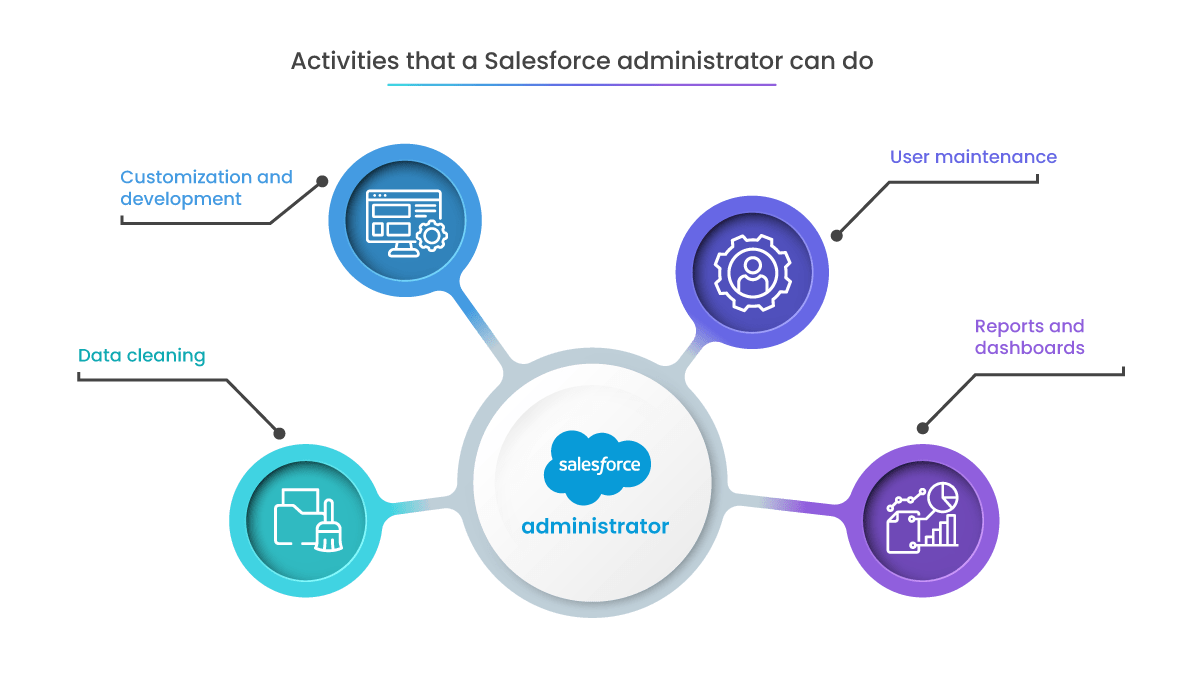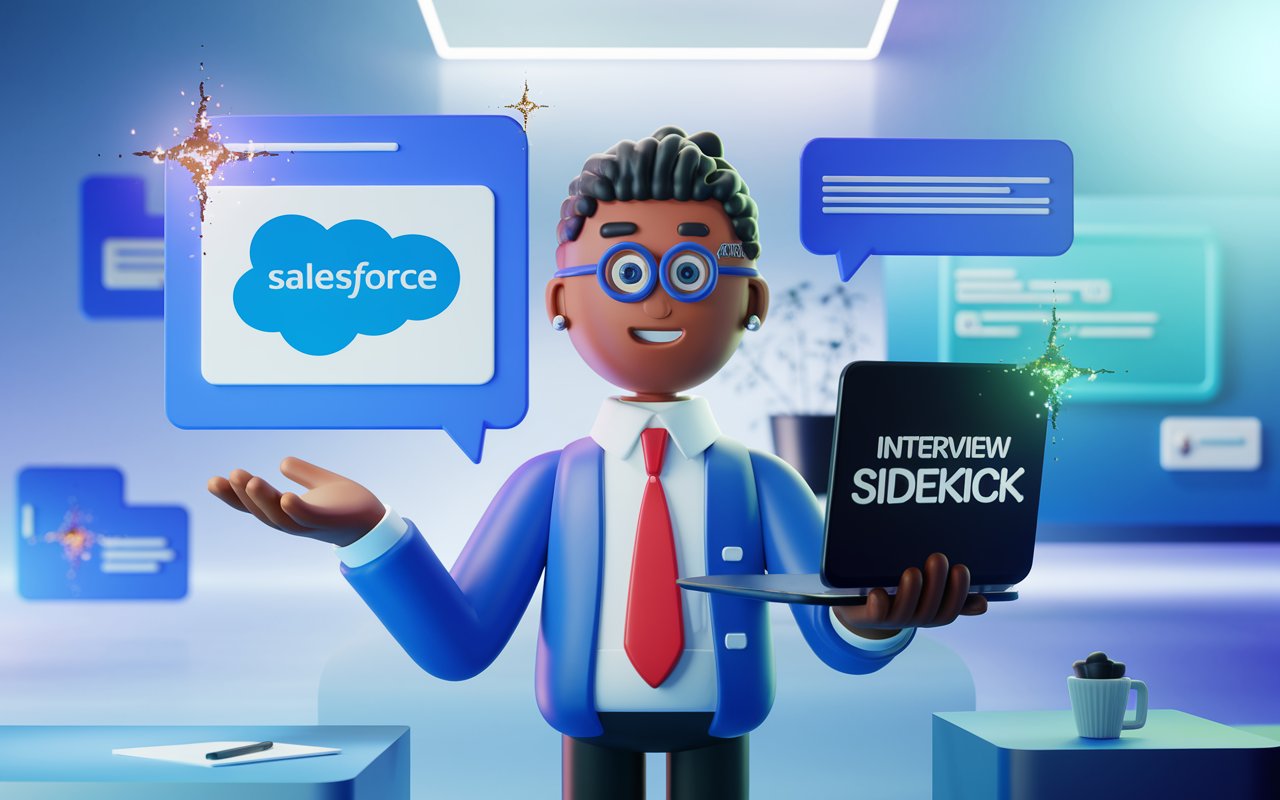3 Key Takeaways
• Common Salesforce Admin Interview Questions: Familiarize yourself with the most frequently asked questions in Salesforce Admin interviews, covering topics like data management, security, automation, and Salesforce best practices.
• Crafting the Best Answers: Learn how to structure your answers effectively, highlighting your technical expertise, problem-solving abilities, and experience with Salesforce tools and features.
• Showcasing Your Experience: Discover tips for demonstrating your hands-on experience with Salesforce, including how to discuss specific projects, challenges you’ve solved, and your understanding of the platform’s ecosystem.
Introduction
Salesforce Administrators have a crucial part in managing and customizing Salesforce to suit an organization’s needs. As more companies need Salesforce professionals, the competition for these jobs increases. If you’re getting ready for a Salesforce Admin interview, knowing the kinds of questions you might face and how to answer them can give you a big edge. This guide covers the most common Salesforce Admin interview questions, along with insights and tips to help you stand out.
Understanding the Role of a Salesforce Administrator
Before we jump into the interview questions, you need to know what a Salesforce Admin does. These folks manage who can access what customize Salesforce to fit the company’s needs, set up automated systems for complex tasks, and make sure the data stays clean and accurate. They’re like the middlemen between what the business wants and what the tech can do, which makes them super important in any company using Salesforce.

Image Source: SkyPlanner
Key Areas of Focus in a Salesforce Admin Interview
- Salesforce Fundamentals
- Employers start with questions to test your basic grasp of Salesforce. They might ask about objects, fields, records, and the Salesforce ecosystem.
- Data Management
- Companies expect Salesforce Admins to handle data well. You’ll probably get questions about how to import and export data, validate it, and keep it secure.
- User Management and Security
- In Salesforce Admin interviews, you’ll often come across questions about setting up user profiles, controlling permissions, and making sure data stays safe.
- Customization and Configuration
- You can bet on facing questions about how to tailor Salesforce objects, build workflows set up process builders, and take care of page layouts.
- Automation Tools
- You might face questions about your hands-on experience with Salesforce automation tools. These could include Process Builder, Workflow Rules, and Flow.
- Reports and Dashboards
- Be ready to answer questions on how to create, tweak, and share reports and dashboards to meet what businesses need.
- Salesforce Updates and Releases
- Salesforce keeps changing. So, interviewers might check if you know about recent changes and how they affect the platform.
Relevant
The Ultimate System Design Interview Guide for Senior Engineers 2024
Best Salesforce Admin Interview Questions and How You Should Answer
What’s a Custom Object in Salesforce?
- Why They Ask: This question checks if you know Salesforce’s data structure.
- How to Answer: A custom object in Salesforce is a table in the database that lets you store info specific to your company. Unlike standard objects (such as Accounts or Contacts), users make custom objects to meet unique business needs. Talk about how you’ve used custom objects in earlier jobs highlighting how they solved specific business issues.
How do you keep data safe in Salesforce?
- Why It’s Asked: Data security plays a crucial role in any CRM platform.
- How to Answer: Talk about the different security features Salesforce offers, like profiles, roles sharing settings, and permission sets. Give examples of how you’ve put these features into action to safeguard sensitive data while making sure users can access what they need to do their jobs.
Can you explain the difference between a Workflow Rule and a Process Builder?
- Why They Ask This: This question checks if you know Salesforce’s automation tools.
- How You Should Answer: Workflow Rules help with simple tasks like sending emails or changing fields. Process Builder, however, can handle trickier processes with lots of conditions and actions. Talk about times when you picked one over the other and explain why you made that choice.
What should you think about when moving data to Salesforce?
- Why They Ask This: Data migration plays a crucial role and needs careful planning.
- How You Can Answer: Talk about the steps in data migration, like mapping data cleaning it up, checking it’s correct, and bringing it in. Mention tools such as Data Loader and other apps that can help out. Stress how important it is to keep data accurate and avoid making copies.
How do you keep up with new Salesforce versions?
- Why They Ask This: Salesforce keeps changing, and keeping up is key.
- How You Should Answer: Tell them how you stay in the loop with Salesforce updates. You might mention that you read Salesforce release notes, take part in the Trailblazer Community, and go to webinars or Salesforce events. Also, talk about any specific changes from recent updates that you’ve put into action in your current or past jobs.
Mistakes to Watch Out for in a Salesforce Admin Interview
- Lack of Real-World Examples: Hiring managers want to understand how you’ve used your skills in actual situations. Make sure to share stories from your past work.
- Ignoring People Skills: Technical know-how is key, but don’t forget to talk about how well you communicate, solve problems, and manage projects.
- Failing to Ask Questions: Show you’re keen on the job and company by asking smart questions about their Salesforce setup how the team works together, and what’s coming up next.
Sample Questions to Ask Your Interviewer
- “How would you describe the setup of the Salesforce team and where the Admin role fits in?”
- “What problems are your Salesforce team dealing with now, and how could I help out?”
- “How does your company handle Salesforce updates and put new features to use?”
FAQs
What are the most common Salesforce Admin interview questions?
Common questions include topics such as the difference between Workflow Rules and Process Builder, how to manage data security in Salesforce, key considerations for data migration, and how to customize Salesforce to meet business needs. Interviewers may also ask about your experience with Salesforce updates and releases.
How can I prepare for a Salesforce Admin interview?
Preparation involves reviewing Salesforce fundamentals, understanding data management, user management, and security, and being familiar with customization and automation tools like Process Builder and Flow. Practicing with real-world scenarios and staying updated on recent Salesforce releases is also essential.
What skills are essential for a Salesforce Admin?
Key skills include a strong understanding of Salesforce customization, data management, user management, and security. Proficiency in automation tools, the ability to generate and analyze reports and dashboards, and staying current with Salesforce updates are also critical. Soft skills like communication and problem-solving are equally important.
How do I explain my experience with Salesforce automation tools in an interview?
Discuss specific examples where you’ve used tools like Workflow Rules, Process Builder, and Flow to automate business processes. Highlight scenarios where you chose one tool over another and explain the outcomes. Demonstrating your ability to handle complex automation tasks can set you apart.
What are the common challenges faced by Salesforce Administrators?
Challenges include managing data quality and security, keeping up with frequent Salesforce updates, customizing the platform to meet evolving business needs, and balancing the demands of different stakeholders. Discuss how you’ve addressed these challenges in past roles to showcase your problem-solving abilities.
To wrap up
To get ready for a Salesforce Admin interview, you need to know the platform well and understand what the job involves. If you get familiar with common questions they might ask and practice your answers, you’ll be in good shape to show off what you know and land the job. Just remember to mix your tech know-how with real-life examples and show how you can use Salesforce to help the business do better.




